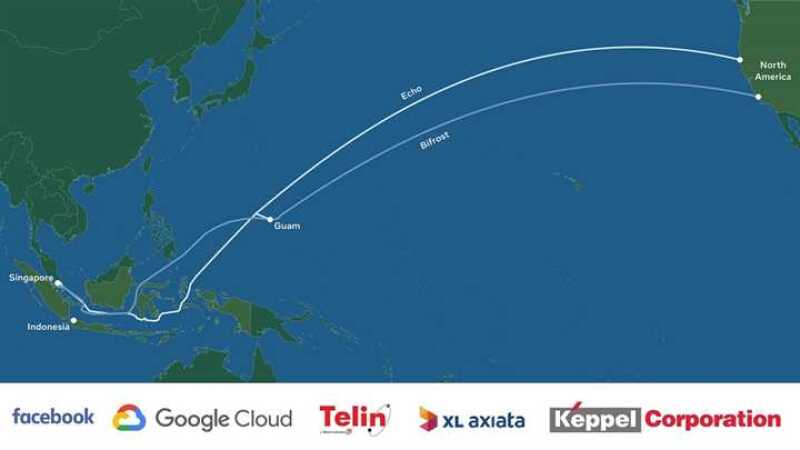The first called Echo, is being developed in partnership with Google and Indonesian telco XL Axiata and has a completion date of 2023.
In a blog post, Google’s vice president of Global Networking Bikash Koley confirmed that Echo will run from Eureka, California to Singapore, with a stop-over in Guam, with plans to also land in Indonesia. And once live will “first-ever cable to directly connect the US to Singapore with direct fibre pairs over an express route”, the system will support applications running the Google Cloud Platform (GCP) regions in the area.
While BiFrost is being built in collaboration with Telin, a subsidiary of Indonesia's Telkom and Singaporean conglomerate Keppel, with a tentative RFS of 2024.

In statement, Keppel confirmed that BiFrost will span over 15,000km in length connecting Singapore, Indonesia, the Philippines, Guam to the west coast of the US. The company also shared that its share of the total project costs in the Bifrost Cable System as a joint build partner will be approximately $350 million.
ASN have been awarded the contract to supply and install the Bifrost Cable, with Alain Biston, president of ASN saying: “We are proud that Facebook, Keppel and Telin have trusted ASN to build this direct Singapore-North America cable. ASN will mobilise its enhanced production facilities to deliver a highly reliable and high-capacity system, thanks to ASN-developed SDM technology.”
“The collaboration in Bifrost Cable System will cater a massive demand of internet from Indonesia to the world and vice versa, as well as to realise Telin’s vision as the Global Digital Ecosystem Enabler,” added Telin’s CEO Sukardi Silalahi.
According to Facebook, the Covid-19 pandemic has “increased the need for reliable internet access” and in particular demand for the 4G, 5G, and broadband has been especially high and BiFrost and Echo will help support this accelerated growth.
Speaking to Reuters, Kevin Salvadori (pictured), vice president of network investments at Facebook said: "Named Echo and Bifrost, those will be the first two cables to go through a new diverse route crossing the Java Sea and they will increase overall subsea capacity in the trans-pacific by about 70%."
The news follows Facebook’s announcement made in 2020, when the company confirmed it would rollout 3,000km of metro fibre in 20 cities in Bali, Java, Kalimantan, and Sulawesi. It also comes as tech company plans to expand its public wifi hot spot development project.
At the same time, Salvadori confirmed that the still to be launched Pacific Light Cable Network (PLCN) that has faced numerous roadblocks including being blocked by the US authorities on security grounds, is still being progressed.
"We are working with partners and regulators to meet all of the concerns that people have, and we look forward to that cable being a valuable, productive transpacific cable going forward in the near future," said Salvadori.






